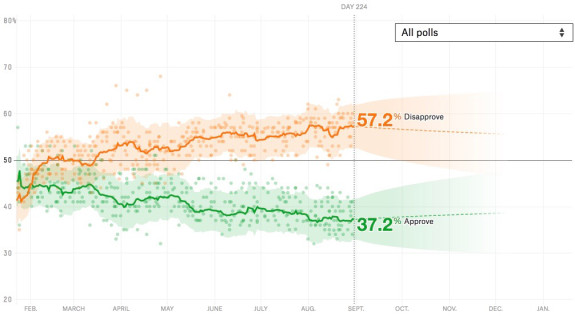There is some overlap between groups there, of course, and the survey compared Trump’s numbers now to his scores in February, when he enjoyed a modest post-inaugural bump. But with his approval
consistently at or
around historic lows for a president at this point in his first term and Republicans in Congress struggling themselves, it has become increasingly clear that even his base is not immune to the downward pressure.
The President is also now underwater with white non-college adults, his approval at 46%, down from 56% earlier this year. Among all whites, he is down 8 points, to 41%. Trump has also seen significant falloff with older Americans. Among seniors (65+), he’s down double digits, from 48% to 38%. For those with retirement on the (perhaps distant) horizon, ages 50 to 64, Trump’s approval is also at 38%, down from 47% in February.
The significance of those numbers is underlined by
post-election polling from 2016, which helped us map Trump’s strongest demographics. Per a Pew report at the time, 67% of whites without college degrees voted for Trump, while only 28% backed Hillary Clinton, the largest exit poll margin in that demographic since 1980.
A
Monmouth University poll in August showed that six in 10 people who approved of Trump’s job performance (61%) said they couldn’t think of anything Trump could do that would make them disapprove of him. A similar 57% of those who disapproved of his performance said they would never change their minds.
But in a similar question
from the Public Religion Research Institute this week, that number is significantly different. Only 37% of people who approved of Trump said there was almost nothing he could do to make them reconsider their support — nearly 25 points lower than the Monmouth question from August. A similar six in 10 people who disapprove say they would never change their minds in the PRRI poll. (These are not apples-to-apples comparisons since different pollsters use different sampling and question wording. Still, the figures are striking.)
Though the Pew numbers clearly show a downward trend since Trump took office, one that’s in line with just about every other reputable poll on record, the durability of the President’s base support in the long term remains an open question. And even if it does hold, or claw its way back, there’s no guarantee it will keep its political clout.
There are signs that Trump’s base may in fact be slipping:
A poll from Gallup showed the number of people who self-identify as Republicans or Republican-leaning independents has also tapered off — falling from 42% in November 2016 to just 37% now. Their average in 2017 is slated to become the lowest share of Americans in more than a quarter century of surveys.
Given those broad losses, there is good reason to further interrogate some core, underlying assumptions about the electorate. Among them: Does Trump have enough support to bolster his loyalists in the midterms, solidify opposition to the specter of impeachment or carry him to re-election in 2020? It’s becoming increasingly difficult to say.



Leave a Reply
You must be logged in to post a comment.